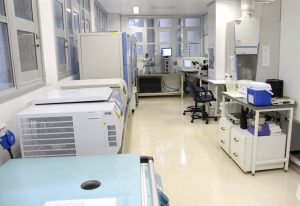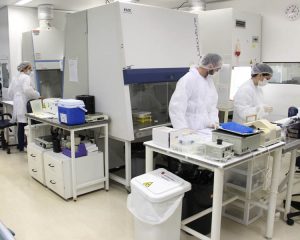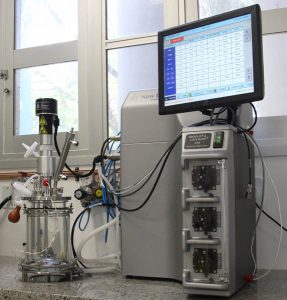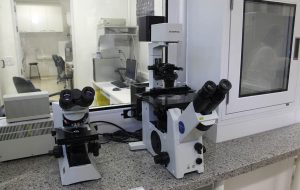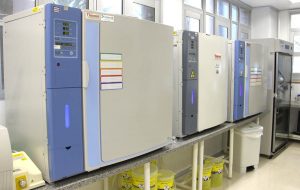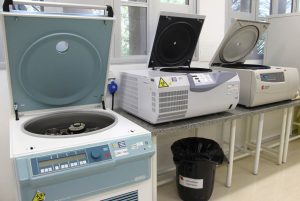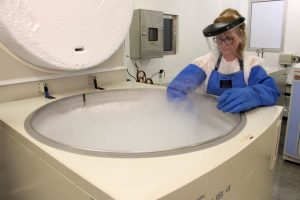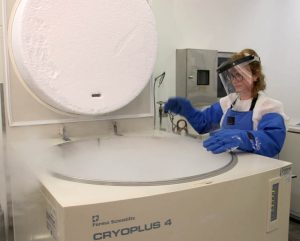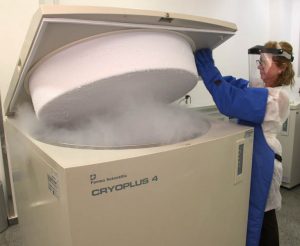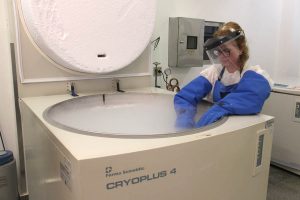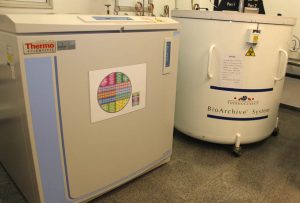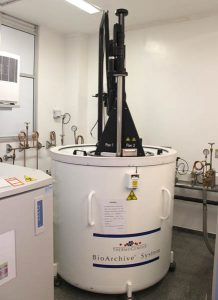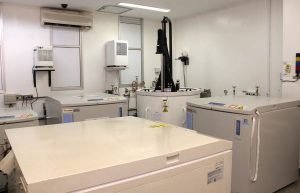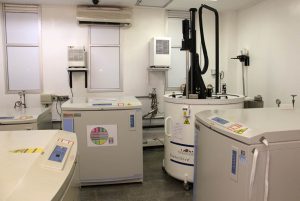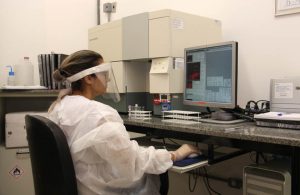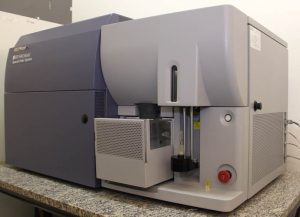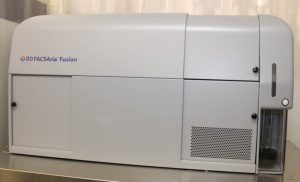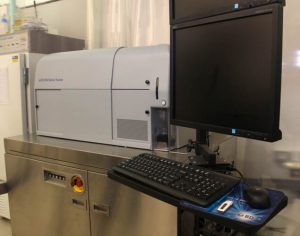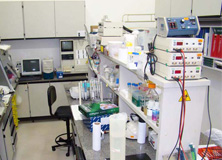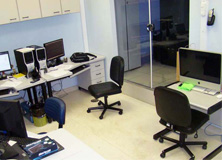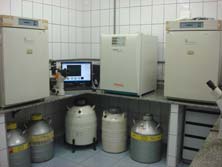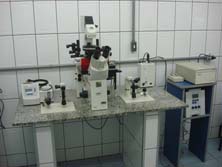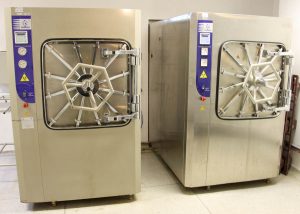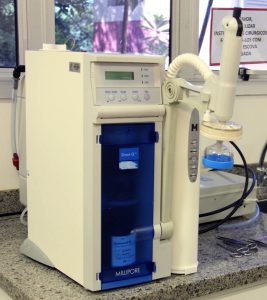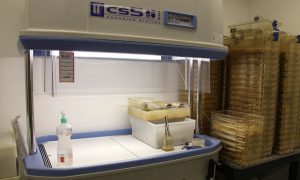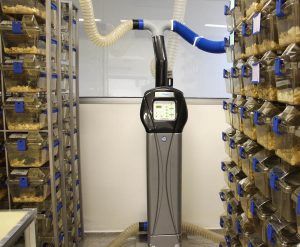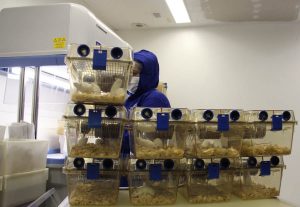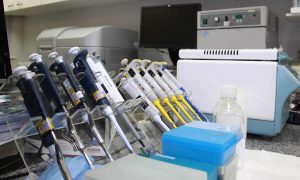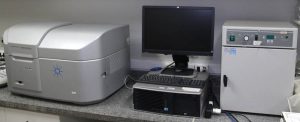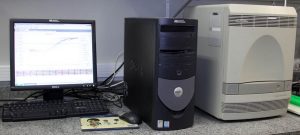Laboratory for Research Teaching (LRT)
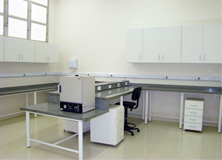
The LRT is a new lab of 36,8 m2 equipped with research infrastructure in molecular and cellular biology that is been used for the development of introductory research projects by basic schools teachers and students.
Cellular Culture
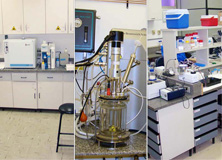 The Cellular Culture Lab. performs researches on mesenchymal stem cells, hematopoietic and endothelial progenitor cells. These basic studies of biological characterization of mesenchymal stem cells contribute to the investigation of their clinical use in regenerative medicine and tissue engineering.
The Cellular Culture Lab. performs researches on mesenchymal stem cells, hematopoietic and endothelial progenitor cells. These basic studies of biological characterization of mesenchymal stem cells contribute to the investigation of their clinical use in regenerative medicine and tissue engineering.
The Laboratory also performs researches to verify the expansion capacity of in vitro hematopoietic progenitor cells and the differentiation potential in dendritic cells.
The evaluation of the vasculogenic potential of endothelial cells EPC is also investigated. These preclinical studies collaborate with the characterization concerning the revascularization potential of an injured organ after vascular trauma such as ischemia or myocardial infarction.
Principal Investigator: Prof. Dr. Dimas Tadeu Covas
Manager: Profa. Dra. Kamilla Swiech Antonietto
Cell Therapy Lab
Cellular Biology
The Laboratory conducts research on somatic stem cells, also known as adult stem cells, such as mesenchymal stem cells, hematopoietic and endothelial progenitor cells. These studies comprise the isolation, culture, expansion and the functional and immunophenotypical characterization of these cells, contributing to a better understanding of the potential clinical usage. The Laboratory also performs assay of spontaneous formation of erythroid colonies to help the Polycythemia Vera diagnosis.
Principal Investigator: Prof. Dr. Dimas Tadeu Covas
Manager: Dra. Maristela Delgado Orellana
Cryobiology Laboratory
The main function is to cryopreserve the cells for transplantation. The products which contain hematopoietic stem cell (HSC) such as bone marrow, umbilical cord blood and mobilized peripheral blood are processed to keep their biological function until the moment of use, what may happen years after the collection. The cell products are mixed with a cryoprotective solution, and then, the cell suspension is exposed progressively to lower temperatures until it reaches -80 to -100 ºC, then it is transferred to a container with liquid nitrogen (storage at -160 ºC) or to mechanic freezers (-80 to -150 ºC).
In addition to the cryopreservation, this Laboratory processes bone marrow with the purpose to reduce the volume of plasma and/or red blood cells in a context of ABO incompatibility.
Principal Investigator: Prof. Dr. Dimas Tadeu Covas
Manager: Dr. Gil Cunha de Santis
The umbilical cord blood (UCB), for being rich in hematopoietic stem cells, may be an alternative source for transplants, instead of bone marrow, mainly for those patients without donors in the family. For this reason, a public bank network of umbilical cord blood, named BrasilCord, has been implemented in Brazil, providing medical care for the Brazilian. It consists of 12 banks spread in the five regions of the country.
At present, banks from Instituto Nacional do Câncer (INCA), Hospital Israelita Albert Einstein, Universidade de Campinas (UNICAMP), and Regional Blood Center of the General Hospital of the Medical School of Ribeirão Preto (CRH – HCFMRP/USP) have taken part in this network. The last three ones, through a partnership, established the RedeCord, which is a public network of the UCBB from the state of São Paulo.
The umbilical cord blood is collected after the childbirth, stored in special bags, evaluated through various patterns, such as the amount of cell, contamination by infectious agents, and so on. Once the analysis has been done, the units of UCB in accordance with the current rules are processed and stored in a container with liquid nitrogen.
Principal Investigator: Prof. Dr. Dimas Tadeu Covas
Manager: Dr. Gil Cunha de Santis
Cytogenetics and Immunofluorescence
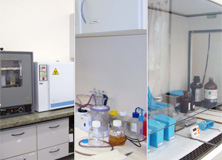
The Laboratory works on two main fields: 1) Molecular and Classical Cytogenetics (FISH) over oncohematological diseases (CML and multiple myeloma) and solid tumors (gliomas), and 2) the investigation of the cytogenetical behavior of stem cells of adults expanded in vitro and their behavior in vivo.
Principal Investigator: Prof. Dr. Dimas Tadeu Covas
Manager: Patricia Vianna Bonini Palma
Flow Cytometry
Through the flow cytometry technique, the Laboratory performs testing such as quantification lymphocyte subpopulations of HIV patients, progenitor stem cells quantification for allogeneic or autologous transplant, platelet syndromes determination, peripheral blood subpopulation quantification, and other methodologies. This technique allows the measurement of the chemical and physical characteristics in particles or in cells in suspension.
The Laboratory also supports researches performed on mesenchymal, endothelial, and dendritic cells. The Laboratory has the Flow Cytometer, which is able to perform the “cell sorter” (separation of subpopulation), to perform simultaneous analyses on seven different fluorescences.
Principal Investigator: Prof. Dr. Dimas Tadeu Covas
Manager: Patricia Vianna Bonini Palma
Gene Transfer
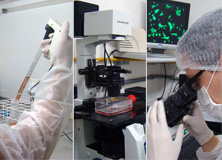 The Gene Transfer Laboratory conducts researches on two main fields and a third one on embryonic stem cells has been recently initiated. The first field is the development of a bioprocess for the production of recombinant coagulation proteins for the treatment of patients with hemophilia A or B.
The Gene Transfer Laboratory conducts researches on two main fields and a third one on embryonic stem cells has been recently initiated. The first field is the development of a bioprocess for the production of recombinant coagulation proteins for the treatment of patients with hemophilia A or B.
At present, the main challenges are the large-scale production of these proteins through bioreactor techniques and the development of animal models for hemophilia using cell-based therapy.
The second field of the research is the evaluation of therapeutic properties of mesenchymal stem cells (MSC) and pericytes, in particular the angiogenic characteristics and immunologic potentials. Both properties are evaluated by real time PCR and by the development of in vivo assay using NOD-scid mice for human stem cell engraftment. Also, the Institution developed two mouse tumor models to investigate the role of MSC in the tumor microenvironment. In this second field, the current challenge is the characterization of more primitive MSC to understand the molecules and signaling pathways involved in vascular lineage commitment which will contribute to design effective stem cell-based therapies.
Principal Investigator: Prof. Dr. Dimas Tadeu Covas
Manager: Dra. Virginia Picanço e Castro
Molecular Genetics
Genomics and Bioinformatics
The major focus of our group is to understand the molecular mechanisms involved in genetic diseases and cancer development. We are using whole genomic analysis to identify and characterize genetic program/gene pathways that drive tumorigenic processes, and biomarkers of diagnosis, prognosis and therapeutic orientation. We are also interested in the characterization of biological properties of cancer stem cells (CSCs), which present self-renewal capacity, unlimited proliferative potential, differentiation competence, and are extremely resistant to radio and chemotherapies. For this purpose, we are applying next generation sequencing in order to profile gene expression, characterize epigenetic alterations, detect chromosomal rearrangements, and single nucleotide variations in coding and regulatory gene regions (RNAseq, ChIP-Seq, DNA methylation, Exome, and Paired-End protocols) in several solid tumors including: head and neck carcinoma, colorectal carcinoma, glioblastoma multiforme and osteosarcoma.
Principal Investigator: Prof. Dr. Wilson A. Silva Jr.
Managers: (MG) Kamila Peroni and (GB) Raul Torrieri
Molecular Biology
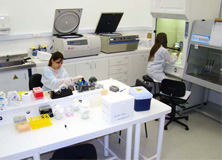 The Molecular Biology Laboratory performs researches on the diagnosis and molecular characterization for human retroviruses such as HIV, HTLV and hepatitis. During the last years, it has improved the investigation area, including researches related to stem cells properties and their modifications, erythrocyte antigens genotyping and gene polymorphism analyses.
The Molecular Biology Laboratory performs researches on the diagnosis and molecular characterization for human retroviruses such as HIV, HTLV and hepatitis. During the last years, it has improved the investigation area, including researches related to stem cells properties and their modifications, erythrocyte antigens genotyping and gene polymorphism analyses.
The Laboratory, through Molecular Biology techniques, has the purpose of producing and developing tools for the diagnosis and therapy in areas such as Hemotherapy and Cell Therapy (molecular diagnosis of human retroviral infections, blood group genotyping).
Principal Investigator: Prof. Dr. Dimas Tadeu Covas
Manager: Dra. Simone Kashima Haddad
Protein Chemistry Center
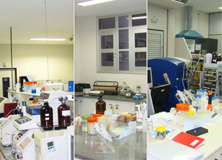 The Protein Chemistry Center develops several studies on function-structure of proteins in experimental model of cancer (using cell lineages and small animals) and human stem cells. The aim of these studies is to offer means to clear up the role of macromolecules (proteins) either in physiologic and pathologic processes. The goal of the research is the discovery of new biomarkers of diseases like cancer for early diagnosis and new targets for therapy development.
The Protein Chemistry Center develops several studies on function-structure of proteins in experimental model of cancer (using cell lineages and small animals) and human stem cells. The aim of these studies is to offer means to clear up the role of macromolecules (proteins) either in physiologic and pathologic processes. The goal of the research is the discovery of new biomarkers of diseases like cancer for early diagnosis and new targets for therapy development.
In stem cells, the Center develops research to understand the cell differentiation in different types of tissues which will be used in the future for regenerative medicine. These studies have been developed by using techniques such as dimensional electrophoresis, capillary liquid chromatography and mass spectrometry.
In addition, the Center develops an important service for the community in the amino acid analysis offering support to the General Hospital (FMRP-USP) and Associação de Pais e Amigos dos Excepcionais (APAE) for the diagnosis of inborn metabolism errors (phenylketonury, tyrosinemy, etc.).
HLA Genotyping Lab
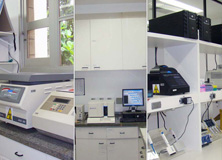
The Human Leukocyte Antigen (HLA) Laboratory provides histocompatibility testing for kidney and bone marrow transplants, working 24h a day. Donor-recipient pairs are analyzed for HLA antigens compatibility. The HLA Laboratory performs compatibility testing for: 1) all cadaver donors of São Paulo State; 2) living kidney and bone marrow donors (family members) for transplantation in the University Hospital of Medical School of Ribeirão Preto, University of São Paulo; 3) volunteer donor banks of bone marrow and umbilical cord blood, REDOME and Brasilcord respectively, which are centralized at the Instituto Nacional do Câncer of Rio de Janeiro.
Principal Investigator: Prof. Dr. Eduardo Antônio Donadi
Manager: Neifi Hassan Saloum Deghaide
Hematology
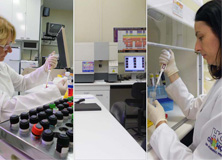
Our laboratory is interested in the study of human telomere diseases. We are trying to understand the molecular and cellular mechanisms through which short and dysfunctional telomeres lead to adult stem cell failure, fibrotic diseases, and cancer. For this purpose, we use telomerase-deficient murine models and induced pluripotent stem (iPS) cells to model disease and to identify abnormal pathways derived from deficient telomere repair. We also screen patient samples for telomere length and mutations in novel genes that may be associated with telomere biology.
Principal Investigator: Prof. Dr. Rodrigo T. Calado
Molecular Morphophysiology and Development
The Molecular Morphophysiology and Development Laboratory (LMMD), located in Pirassununga (100 km from Ribeirão Preto), is part of the Basic Sciences Department at the Faculty of Animal Science and Food Engineering (FZEA) – University of São Paulo (USP). Established on April/2001 with the sponsor and leadership of Prof. Dr. Flávio V. Meirelles, the LMMD currently congregates 9 associated researchers (professors and post-doc fellowships) forming a team-based collaborative research group. The collective aims of the research developed at the LMMD include the understanding of mechanisms of embryo development and pluripotent cell biology, nuclear reprogramming and cytoplasmic inheritance.
In an area of approximately 400 m², with NB1 biossecurity level, the facilities include: (a) complete structure for in vitro production of embryos in a broad range of domestic species, including equipment for embryo and gamete micromanipulation (composed of inverted epifluorescence microscope equipped with micromanipulators, Narishige microinjectors, FemtoJet® microinjector, electrofusion system and Piezo Drill); as well as embryo and cell in vitro culture systems with controlled atmosphere;
(b) facilities for cell analysis, composed of flow cytometer (BD FACSaria) with blue (488nm) and near UV (375nm) lasers and cell sorter for immunophenotyping, apoptosis, cell cycle, post-translation protein modification assays; fluorometer for ATP content, calcium and enzymatic activity assays; and epifluorescence microscope for photodocumentation;
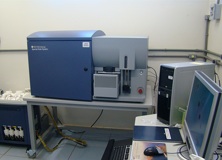
(c) molecular biology facility composed of Real Time PCR (Applied Biosystems 7500 Fast) equipped with High Resolution Melting, Nanodrop 2000, Bioanalyser 2100, thermocyclers, electrophoresis system and 2D gel scanner.
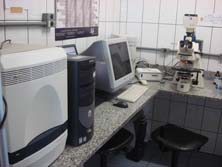
The LMMD facilities also include a research laboratory annex to the Veterinary Hospital of FZEA, currently under construction, with an area of 149.5 m² where will be installed the transgenesis, recombinant proteins and cell therapy laboratories. This laboratory will be part of the Experimental Veterinary Hospital dedicated to Innovative Therapies (Unidade Experimental Clínico Hospitalar de Medicina Veterinária) funded by FINEP (Finep Project 01.10.0023.00), that will allow the development of preclinical tests using domestic animals as models.
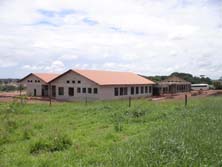
Principal Investigator: Prof. Dr. Flávio V. Meirelles
Manager: Dra. Fabiana Fernandes Bressan
Laboratory for Molecular Genetics
The Laboratory for Molecular Genetics, at the Bioscience Institute, University of Sao Paulo, works with pluripotent stem cells for both basic and applied research. We have established lines of human ESCs in different culture conditions in order to study the epigenetic state of the X chromosome in early human embryonic development. In addition, we explore the use of hiPSCs to (1) model diseases, and (2) to be used in in vitro clinical trials. Towards the latter, we have established a library of hiPSCs representing the genetic admixture of the Brazilian population.
Finally, our laboratory includes The National Laboratory for Embryonic Stem Cells (LaNCE), a GMP facility for the establishment of new lines of clinical grade hESCs/hiPSCs. We are part of the Global Aliance for hiPSC Therapies (GAiT), an internation consortium to establish a bank of clinical grade hiPSCs whith homozigous haplotypes for HLA genes.
Principal Investigator: Profa. Dra. Lygia V. Pereira
Manager: Dra. Mariana Marques Morato
Laboratory of Experimental Animal Studies
In the laboratory, mice (Mus musculus) from various Genetically Modified and Non-Genetically Modified strains are produced and maintained for the purpose of biomedical scientific research. The physical space has equipment structure, constructive and human aspects to maintain the SPF (Specified Pathogen Free) sanitary status of the animals. Equipment is available such as barrier autoclaves, central air conditioning with humidity control, adequate air exchange and filtration, sonicator for sanitizing water fountain nozzles, reverse osmosis, exchange booths, ventilated positive pressure racks and HEPA filter, pass-through, and more.
Principal Investigator: Prof. Dr. Eduargo Magalhães Rego
Manager: Ma. Cleide Lúcia Araújo da Silva
Laboratory of Large-Scale Functional Biology – LLSFBio
The LLSFBio investigates the molecular mechanisms underlying different biological processes in normal and pathological contexts, using modern molecular and cellular biology techniques; including, microarray-based genome-wide functional genomic experiments and automated quantitative fluorescence microscopy or High-Content Screening-HCS. Among our interests, we can highlight: The characterization of Mesenchymal Stromal Cells (MSCs) derived from different tissues 1, 2 and their relationship to other cell types 3. The immunomodulatory mechanisms mediated by MSCs, including, Adenosine production mediated by CD73 and CD39 4, 5; induction of T regulatory cells (Tregs) 6 and modulation by Toll-Like Receptors (TLRs) 7, 8.
The molecular characteristics of Hematopoietic Stem and Progenitor Cells (HSPCs) derived from Bone Marrow and Umbilical Cord Blood 9, 10. The regulatory mechanisms acting during in vitro generation of T-lymphocytes 11 or induced Tregs 12. The study of aberrant pathways and processes in Hematological Diseases, such as, Mantle Cell Lymphoma (MCL) 13, Chronic Lymphocytic Leukemia (CLL) 14 and Acute Lymphoblastic Leukemia (T-ALL) 15 and Sickle Cell Disease (SCD) 16. Finally, we have recently started to explore the roles of microRNAs on pluripotency and differentiation of human Embryonic Stem Cells (hESCs) and embryonal carcinoma cells, as well as in the context of somatic cell reprograming into induced pluripotent stem cells (iPSCs) 17.
Principal Investigator: Prof. Dr. Dimas Tadeu Covas
Manager: Prof. Dr. Rodrigo Alexandre Panepucci

